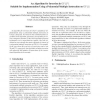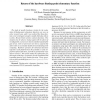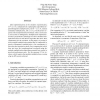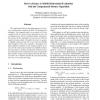ARITH
2007
IEEE
15 years 6 months ago
2007
IEEE
An algorithm for inversion in GF(2m ) suitable for implementation using a polynomial multiply instruction on GF(2) is proposed. It is based on the extended Euclid's algorithm...
95
Voted
ARITH
2007
IEEE
15 years 6 months ago
2007
IEEE
The study of specific hardware circuits for the evaluation of floating-point elementary functions was once an active research area, until it was realized that these functions were...
121
click to vote
ARITH
2007
IEEE
15 years 6 months ago
2007
IEEE
The IEEE Standard 754-1985 for Binary Floating-Point Arithmetic [1] was revised [2], and an important addition is the definition of decimal floating-point arithmetic. This is inte...
108
click to vote
ARITH
2007
IEEE
15 years 6 months ago
2007
IEEE
We address the problem of computing a good floating-point-coefficient polynomial approximation to a function, with respect to the supremum norm. This is a key step in most process...
ARITH
2007
IEEE
15 years 6 months ago
2007
IEEE
In this paper we explore the relationship between adder topology and energy efficiency. We compare the energy-delay tradeoff curves of selected 32-bit adder topologies, to determi...
122
click to vote
ARITH
2007
IEEE
15 years 8 months ago
2007
IEEE
Most implementations of the modular exponentiation, ME mod N, computation in cryptographic algorithms employ Montgomery multiplication, ABR−1 mod N, instead of modular multiplic...
120
click to vote
ARITH
2007
IEEE
15 years 8 months ago
2007
IEEE
We describe a new method to perform the modular exponentiation operation, i.e., the computation of c = me mod n, where c, m, e and n are large integers. The new method uses the di...
ARITH
2007
IEEE
15 years 8 months ago
2007
IEEE
The compensated Horner algorithm improves the accuracy of polynomial evaluation in IEEE-754 floating point arithmetic: the computed result is as accurate as if it was computed wi...
111
click to vote
ARITH
2007
IEEE
15 years 8 months ago
2007
IEEE
Abstract— Floating-point arithmetic is notoriously nonassociative due to the limited precision representation which demands intermediate values be rounded to fit in the availabl...





